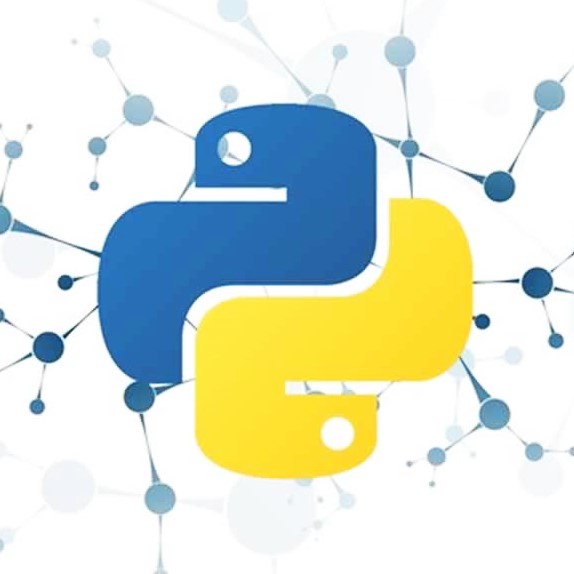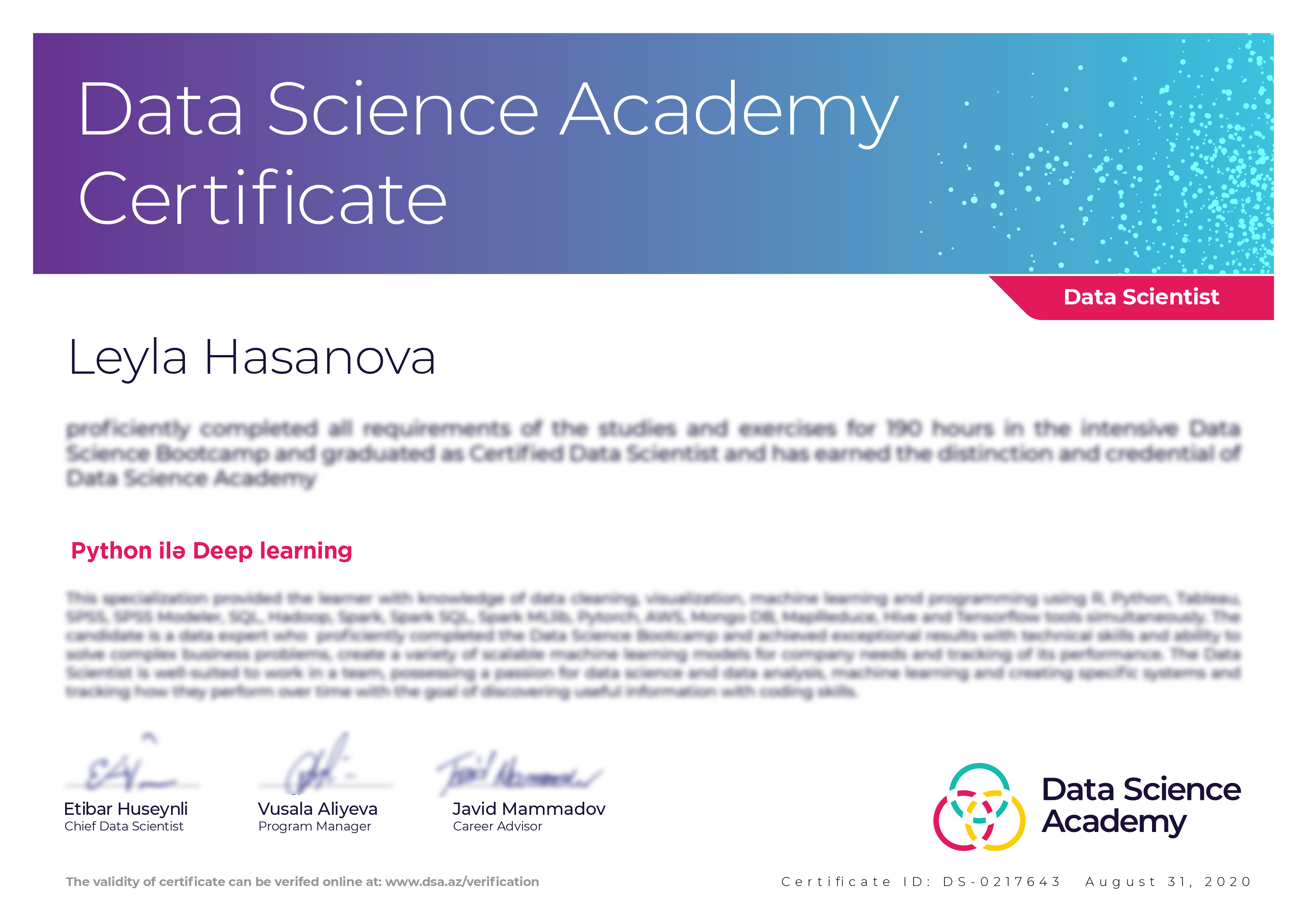
Machine Learning with Python
In the **Machine Learning with Python** training, you will learn dozens of machine learning methodologies, from preparing your data for analysis to diagnostic analysis, forecasting, machine learning, cluster analysis, time series analysis, model evaluation, and integrating the developed model into various platforms. Machine learning plays a crucial role in automating decision-making processes in real-world business environments. Throughout the training, you will gain **practical experience** by applying key methodologies used in **marketing, finance, business, healthcare, and government decision-making** to real-world problems.
Training table
Machine Learning with Python
Machine Learning with Python
Maschinelles Lernen mit Python
Машинное обучение с Python
Information about the training
During the training, you will work with **regression, classification, and clustering algorithms**, applying **Hierarchical Clustering, K-Means Clustering, CATBOOST, XGBOOST, LightGBM, and AutoML algorithms** to fully automate your analytical projects. To enhance the accuracy of **machine learning algorithms**, you will **practically implement** methodologies such as **hyperparameter tuning, bagging, boosting, and ensemble learning**. Additionally, you will learn various evaluation methods, including **Precision, Recall, ROC Curve, and Gini Coefficient**, to assess your models effectively. With these new skills, you will be able to conduct **descriptive and predictive analyses** on data. This training is designed for individuals who want to analyze **large-scale datasets in enterprises and organizations** to support decision-making. It covers a wide range of **practical topics, from basic to advanced levels**. Moreover, the training will help participants become **highly competitive professionals** in the job market by applying cutting-edge **machine learning techniques** immediately after completing the course, accelerating their careers in **data science**.
Who is this training for?
This training is ideal for:
- Individuals with Data Science knowledge who want to deepen their expertise with advanced and modern topics to stand out in the job market.
- Those who want to learn complex Machine Learning topics using Python.
- Programmers and data engineers interested in learning analytics.
- Business managers, business analysts, data analysts, and those passionate about data analytics.
- Anyone looking to work with large-scale datasets.
- Researchers working with data-driven insights.
- Students and professionals building a career in Data Science.
- Those involved in sales, supermarkets, telecommunications, banking, and other business sectors, as well as government institutions, who analyze data and prepare reports.
Certificate
Those who successfully complete the training will receive a **Certified Data Scientist** certificate, while others will be awarded a **participant certificate**. You can view a sample certificate on the right side.

Machine Learning (Python) Training 1
Machine Learning with Python
codebasics
A complete beginner-level video for the new Machine Learning tutorial. Thanks for the video: codebasics.
Syllabus
Session 1
- What is Machine Learning?
- Machine Learning Algorithms: Linear & Decision Tree Regression, SVM, Naive Bayes, Random Forest
- Model Evaluation Methods: RMSE, MSE, R squared, Adjusted R squared
Case Study 1
Building a Linear Regression model to predict the number of confirmed, infected, recovered, and deceased cases for the next 7 days during the Covid pandemic.
Session 2
- Classification Models
- Logistic Regression, Decision Trees, Random Forests, K-Nearest Neighbors (KNN), Support Vector Machines (SVM)
- Key Performance Metrics
- Accuracy, Precision, Recall, ROC & AUC Curve, Gini Coefficient
Case Study 2
Predicting whether patients have heart disease using classification models such as SVM, Decision Tree, Random Forest, Logistic Regression, Naïve Bayes, and KNN, and determining the algorithm that provides the best results.
Session 3
- Optimization Methods
- Cross Validation, Lasso Regression, Ridge Regression, ElasticNet Algorithm
- Ensemble Learning Methods
- Bootstrap Sampling and Boosting
- CATBOOST, XGBOOST, LightGBM, and AutoML algorithms
Case Study 3
Predicting a company's bankruptcy risk using Bagging and Boosting classification models.
Session 4
- Object-Oriented Programming in Python
- Creating Python Classes
- Inheritance from Other Classes in Python
- Adding Methods to Classes
- Creating Object Attributes
Case Study 4
Creating classes based on the "Transport Vehicles" and "Cars" databases.
Session 5
- Unsupervised Learning and Hierarchical Clustering
- K-Means Clustering, Elbow Method, and Silhouette Analysis
- PCA - Eigenvalue and Eigenvector
Case Study 5
Categorizing countries based on socio-economic and health factors using PCA, K-Means, and Hierarchical Clustering methods.
Session 6
- Introduction to Web Scraping
- Basic HTML Structures
- Working with the BeautifulSoup Library
- Introduction to the Scrapy Library
Case Study 6
Extracting data from the Reddit website.
Session 7
- Hyperparameter Tuning by Hand
- Grid Search, Randomized Search
- Bayesian Optimization
Case Study 7
Predicting whether an asteroid is dangerous using the XGBoost model with Bayesian Optimization and Randomized Search.
Trainers

Emil Mirzəyev
SÜNİ İNTELLEKT VƏ STRATEJİ QƏRARQƏBULETMƏ RESEARCHER, UNİVERSİTY COLLEGE LONDONDr. Emil Mirzayev holds a dual PhD in Economics and Business Administration and is currently engaged in scientific research at the intersection of Artificial Intelligence and Strategic Decision-Making at University College London, one of the world's top universities. He has nearly 10 years of experience with Python and Data Science, and has presented his work at prestigious institutions like MIT, Harvard, and LBS, as well as at numerous international conferences. In Azerbaijan, he has also conducted multiple free workshops on topics related to Machine Learning and AI.

Əhməd Əhmədov
Senior Data Scientist, Porsche AGAhmad Ahmadov pursued his master’s education in "Data Mining" and "Big Data" at Yonsei University in South Korea. He has more than 10 years of experience in artificial intelligence and data analytics. He has been working at Porsche AG in Germany for 6 years as a Senior Data Scientist and Tech Lead. He is mainly responsible for the development of AI models and project management in fields such as "GenAI," "Digital Assistants," "Customer Mobility Predictions," "Charging Experience Optimization," and "Content Quality Analysis."
His previous professional experiences include:
* Dresden University (Germany): Scientific Researcher in AI and Data Science. Research areas: "Data Imputation," "Data Quality," "Information Retrieval," "Web Tables," "Semi-Structured Datasets," and "Machine Learning." (4 years)
* Bakcell: ERP Technical Analyst. (1 year)
Additionally, he is the author of numerous scientific articles published at various international conferences.